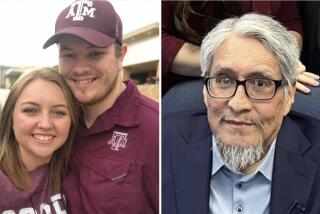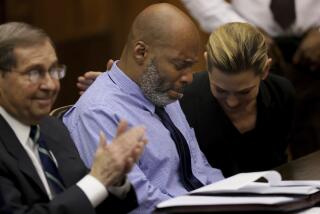Layton Sentenced to Life in Ryan’s Death
SAN FRANCISCO — Larry Layton was sentenced Tuesday to life in prison for his role in conspiring to murder Rep. Leo Ryan in Guyana in 1978.
But Layton, saying he wishes he could ease the pain of survivors of the Jonestown massacre, could be freed within five years.
U.S. District Judge Robert F. Peckham recommended that parole authorities consider releasing Layton in five years. He also gave the former Peoples Temple follower credit for spending a year and 49 days in jail while his trial was pending--thereby reducing the potential sentence by that amount of time.
Peckham said he was particularly struck by pleas for leniency from four jurors, two prosecution witnesses and survivors of an attack by Layton at an airstrip outside the Guyanese encampment of Jonestown.
Although he called it a “very grave crime,” Peckham said Layton has shown “great remorse,” and his actions in 1978 reflected how the cult leader, the Rev. Jim Jones, destroyed the will of his followers.
“Although Larry Layton must be held responsible for his actions, a just sentence requires consideration of the environment in which Layton and other members were virtually imprisoned,” Peckham said.
Layton, 41, is the only former Peoples Temple member who was tried in the United States in connection with the slaughter on Nov. 18, 1978.
One of three family members who joined the cult, he was convicted Dec. 1 of conspiring with Jones to murder Ryan, a crusading San Mateo Democrat, and of conspiring in the attack on Richard C. Dwyer, then deputy chief of the U.S. mission in Guyana. Dwyer, who was wounded in the attack, has retired from the Foreign Service.
In all, Layton was convicted of four charges--conspiracy and aiding and abetting in the shootings of Ryan and Dwyer. The conspiracy to murder Ryan carried a mandatory life sentence, though federal law makes him eligible for parole in 10 years. Peckham sentenced Layton to 15 years in prison for the other three counts, but said the terms will run concurrently with the life term.
‘Sincere Regrets’
Layton, expressionless for most of the hearing and dressed casually in a light blue sweater, said he extended his “most sincere regrets” to the families of the victims.
“I only wish there was something I could do to ease the pain,” he said, fighting to keep his voice from breaking.
Robert Bryan, who took over the case after Layton’s conviction, said he hopes to win a new trial for Layton. He said Layton was insane at the time and was drugged by Jones with a mood-enhancing stimulant. He called Layton “the ultimate victim of Jim Jones.”
U.S. Atty. Joseph Russoniello did not criticize Peckham’s sentence, but in urging that Layton serve 20 years before being eligible for parole, he cited Layton’s suggestion to Jones that Layton use dynamite to blow up Ryan’s plane and its unwanted outsiders--a fact that was not revealed until Tuesday.
Sentencing Report Cited
Layton was also quoted in a sentencing report to Peckham as saying that a cultist close to Jones had asked that he stop Ryan from leaving and gave him a gun. Layton’s two ex-wives--both had been lured from Layton by Jones--also encouraged him to somehow stop Ryan, Russoniello said.
“I am taking solace in knowing that Larry Layton is going to pay back society for having assassinated the first congressman ever in this country,” said Assemblywoman Jackie Speier (D-San Mateo), who had accompanied Ryan on the trip as an aide.
Ryan traveled to Guyana after winning his fourth congressional term to investigate reports from cult defectors--including Layton’s sister, Debra--that the cult was holding members against their will.
He had completed his mission and was trying to take off from an airstrip six miles from the jungle compound of Jonestown when a trailer filled with eight armed Jones devotees pulled onto the runway and began firing.
Slain at Airstrip
Ryan, three journalists and a defector were killed. Dwyer, Speier and nine others were wounded. Layton was already aboard one of the two planes, posing as a defector. He pulled out a gun and shot and wounded two cult defectors.
Jones had ordered the ambush out of fear that Ryan would expose the cult. With Ryan dead, Jones concluded that the United States would retaliate, so he exhorted his followers to kill themselves by drinking cyanide-laced punch. Those who refused were shot; children were injected with poison. In all, 913 died. Jones died of a gunshot wound to the head.
Layton was arrested shortly after the killings by Guyanese authorities and signed a confession taking responsibility for the airstrip deaths--a confession that his lawyers maintained was coerced. Although he was acquitted in Guyana, he was returned here to face charges related to the shootings of Ryan and Dwyer, who were protected under U.S. law.
Layton’s first trial ended in a hung jury in 1981, with 11 of the 12 jurors voting to acquit him. In between his trials, he lived under an assumed name in Eureka and, more recently, in San Francisco, where he sold real estate and took computer classes. Layton’s mother, also a Peoples Temple member, died of cancer in Jonestown two weeks before the massacre. Layton’s lawyer said that made Layton more susceptible to Jones’ spell.
Jones, who founded his church in Indiana and moved here in 1970, relocated to Guyana, a former British colony in South America, in 1977 after critical press accounts about his politically prominent sect.
More to Read
Sign up for Essential California
The most important California stories and recommendations in your inbox every morning.
You may occasionally receive promotional content from the Los Angeles Times.









